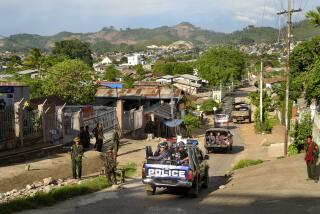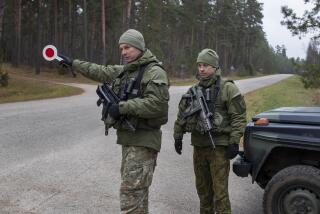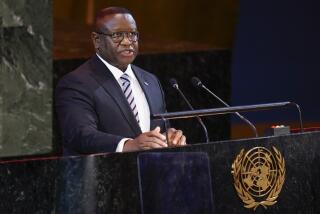Soviet Troops Seize Lithuanian Property : Baltics: They occupy nine buildings and confiscate equipment in an action that local officials say breaks a truce between the republic and Moscow.
- Share via
MOSCOW — Soviet troops occupied nine buildings across Lithuania on Thursday, confiscating trucks, cars, tractors, building supplies and other equipment in action that Lithuanian officials saw as breaking the truce between the republic and the central government.
The early morning occupation of driver-training schools, aviation clubs, sports facilities and a hotel was the most sweeping action by Soviet troops in Lithuania since January, when soldiers stormed the television broadcast center in Vilnius, killing or fatally wounding 14 unarmed civilians.
Algimantas Norvilas, a member of Lithuania’s Supreme Council, told a meeting of the legislature that the Soviet army now “is seizing everything in its path.”
Five of the facilities, including three driver-training schools and two airstrips, were still occupied late Thursday night, according to Haris Subacius, a spokesman for the Lithuanian Parliament. No injuries were reported.
The Soviet Defense Ministry told the official news agency Tass that the reports of soldiers seizing property in Lithuania were incorrect.
According to a military spokesman, the equipment was part of 200 trucks the Defense Ministry had given to the republic’s Voluntary Society for the Assistance to the Army, Air Force and Navy, a national organization that prepares young men for military service and runs educational and sports programs for the community.
After declaring independence more than a year ago, Lithuania dissolved these societies, and “the trucks got into the hands of other people,” Tass said.
“Despite repeated demands, they refused to give them back to their rightful owners,” Tass continued. “This is why the command of the Baltic Military District began to take measures to recover the trucks. . . . About 150 trucks were recovered and sent to units of the Baltic Military District.”
Lithuanian officials took the army’s action as an affront to what they believed was a truce between Moscow and Vilnius.
“We are getting the impression that the leadership of the Soviet Union has either lost control over the military units deployed in Lithuania or is lying when in contact with the Lithuanian leadership,” Audrius Azubalis, spokesman of the Lithuanian government, told a press briefing.
“Just last night, during a telephone conversation between President of the Republic of Lithuania Vytautas Landsbergis and Soviet Deputy Prime Minister Vitaly K. Doguzhiev, the latter affirmed that there can be no talk of the use of force and that all disputed questions must be solved by political and economic agreement.”
Richard Yarmolovec, an officer of the Lithuanian Interior Ministry, said in a telephone interview that the Soviet army’s latest actions could upset the delicate calm that has characterized Lithuania in the aftermath of the crackdown by Soviet troops in January.
“The atmosphere is very tense here all the time,” Yarmolovec said. “I don’t think this will escalate into an armed conflict, but it does make the atmosphere here even more tense.”
The television tower is still under the control of Soviet troops, and other buildings in Lithuania have been occupied temporarily in an apparent attempt by the Kremlin to remind Lithuanians that they are not yet independent of the Soviet Union. A soldier guarding the television tower was accidentally shot to death Thursday by another guard, authorities said.
Lithuania has been struggling for independence from Moscow for more than two years and has tried to play tough with the Soviet leadership. The Kremlin, however, has insisted on dealing with Lithuania on its own terms.
Residents in Lithuania--as in Latvia, Estonia and Georgia--voted overwhelmingly for secession from the Soviet Union in a referendum this year, but Soviet President Mikhail S. Gorbachev said the Lithuanians’ plebiscite was illegal even before it took place, and he has not acknowledged it since.
More to Read
Sign up for Essential California
The most important California stories and recommendations in your inbox every morning.
You may occasionally receive promotional content from the Los Angeles Times.













